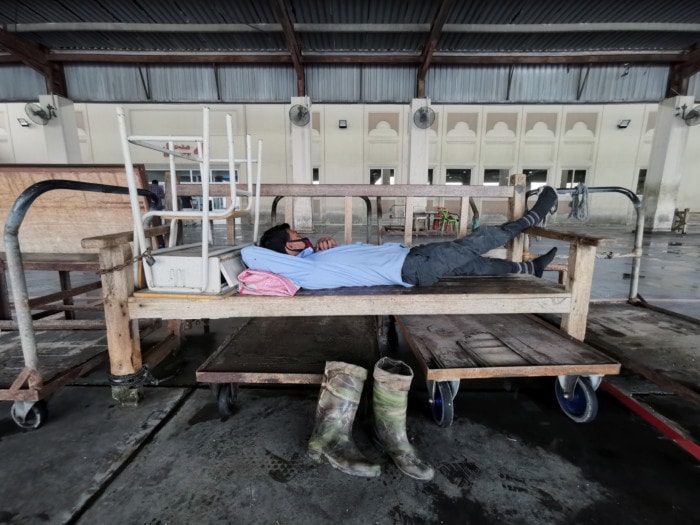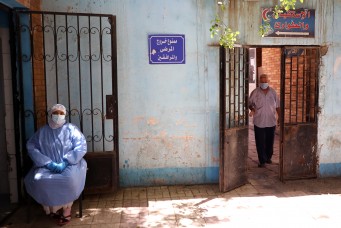Forced Returns: COVID-19 Puts International Labor Migrants at Risk
What happens to labor migrants, predominantly in the Gulf region, when they are forced to return home?

An Asian labour wearing a protective face mask sleeps as he waits for odd jobs in central market, following the outbreak of the coronavirus disease (COVID-19), in Manama, Bahrain, May 7, 2020. Hamad I Mohammed/Reuters
As the coronavirus continues to spread across the globe, many people are experiencing extreme interruptions to daily livelihood, and particularly to access to goods, services, and trade as global supply chains and labor markets are disrupted. That puts in limbo the fates of the millions of migrant workers spread across the world on whom markets rely on to operate.
For example, an estimated 20 million people holding Indian passports live and work outside their home country, ten million of which currently work in Gulf Cooperation Council (GCC) states. It is estimated that nearly 10-15 percent of all Indian migrant workers in the Gulf will be forced to return home.
“They are forced to return because of the COVID-19 pandemic; meanwhile, they have not made money and they have not even made the money to pay their recruitment costs—what they spent to go to the Gulf,” Irudaya Rajan, a professor at the Centre for Development Studies in Kerala, India, one of the speakers at a webinar held by the Center for Migration and Refugee Studies in the School of Global Affairs and Public Policy at the American University in Cairo.
The webinar examined what international labor migrants are experiencing during the coronavirus crisis, as well as what lies ahead for international labor migrants, particularly to and within the Middle East, in a post COVID-19 world. Forced return migration will have grave consequences for labor migrants who remain financially unstable and dependent on their international work contracts. Many migrants might even try not to leave, he added.
Rajan described migration to the Gulf as the “lifeline for the Keralan economy,” as labor migrants from that state in southwestern India make up 2.5 million workers in the Gulf. Those forced returned migrants will require the most support because they likely have not completed their work contracts, still have debt from visa payments, and/or did not receive full compensation of wages before leaving. “When you go to the Gulf you only get the labor card, so you have to come back. So, there have been [return] migrants who have been coming back for so many years. We don’t need to worry about them because they are coming with some money. [Forced return migrants] I think these people will be in deep trouble,” said Rajan.
Other countries, such as Egypt, are also experiencing difficulties as a result of the return migration of international workers due to COVID-19. Dina Abdel Fattah, an AUC assistant professor of economics, estimates that Egyptian returnees in the wake of COVID-19 will number around one million. The implications of these returnees will be a shock to an already distressed national labor market system, which will somehow need to absorb these new job seekers. “The Egyptian labor market by itself is facing its own demand shock, so we are seeing a problem with the demand for labor within the current situation of the economy, and now we are facing another kind of supply shock where Egyptians are returning from the Gulf and adding to the strains on the labor market,” said Abdel Fattah. With the added supply of labor, unemployment rate estimates are expected to rise between 11-16 percent in the remaining months of this year.
Remittances, which are vital to Egypt’s economy and reached $26.8 billion in 2019, the highest in Africa that year, are largely used for consumption at the household level. As a result, the reduction in remittances flowing into the country by migrants abroad will decrease with their return, leading to less household consumption and further economic setbacks. “To an already slowing down economy, this is going to hurt not only at the macro level and the foreign currencies, but at the household recipients of the remittances themselves,” Abdel Fattah explained.
Some strategies to effectively manage returnees include labor market reintegration, or investment in education and skills preparation for re-migration. “For the first time the ministry [Ministry of Manpower and Immigration] is working through a committee on trying to know and record the Egyptians who are coming back and trying to understand what skills they have. It is preparing them [return migrants] either to integrate back into the Egyptian economy, or to be at the forefront whenever the Gulf economies start operating again,” said Abdel Fattah.
There are also opportunities for Egypt to look to alternative and emerging new demands for labor, such as agriculture or care work, in European countries where the need has increased during the pandemic. At the national level, Abdel Fattah called for designing skills-matching initiatives and addressing the largely young and educated unemployed population by prioritizing migration policy which seeks to fill labor demand gaps in international markets.
Combating Labor Abuse
The situation for many labor migrants, especially domestic workers, in the Middle East and North Africa region has been clouded with uncertainty, violence, and labor rights abuses. Senior Global Advisor for the UN Women Jean D’Cunha said that 44 percent of all domestic workers in the GCC are women, and 62 percent of all female migrant workers in GCC states are domestic workers, not including the many undocumented migrants. D’Cunha emphasized that the situation resulting from the spread of the global pandemic has exposed the deep global neglect for labor migrants, especially domestic workers and those in the care sector.
“In the context of the COVID-related panic, we are seeing heightened xenophobia and abuse of domestic workers, particularly part-time live-out workers, who are being terminated from service because they are construed as transmitters of the virus or unhygienic,” D’Cunha said. Examples of increased xenophobia, loss of employment, housing and protection, and lack of access to medical care resources has left migrant workers in precarious situations. Domestic workers are particularly at risk as domestic care work is often not considered formal employment by host governments, and therefore workers remain unprotected. “Their undocumented status leaves them with no incomes, so they have no access to food or rent. They are thrown out of their homes, stranded, borders are shut, and they have no access to COVID information, hygiene products or services,” explained D’Cunha.
Crowding in detention centers and informal housing situations puts labor migrants at further risk of infection. Both D’Cunha, and Rsyzard Cholewinski of the ILO Regional Office for Arab States, commented on the infamous kafala sponsorship system which dictates labor migrant work conditions and ties employment contracts to employers in many of the countries in the Gulf and MENA regions. Cholewinski stated that the sponsorship system, low wages, limited social protections, and the lack of focus on migrant workers’ voices are structural issues which go beyond the global health crisis, but which are exacerbated as a majority of Covid-19 infections have been among migrant workers. “This crisis has effectively magnified many challenges to labor migration governance that were already there in the region,” he said.
The ILO has issued guidelines for countries to follow to provide the most protections for international migrant workers. While that comprises the inclusion of all workers regardless of legal standing to access medical care in the destination country, Cholewinski recognized this may not be happening in practice, nor does it relieve fear of deportation for those workers without documentation in the event that they present themselves at medical centers. The ILO is conducting advocacy work with destination countries to ensure migrant workers are included in COVID-19 responses and to support migrants who are stranded in destination countries to not forgo their international labor rights and entitlements. Cholewinski spoke of the rapid assessments which the ILO is performing in destination countries like Lebanon to better understand their circumstances and experiences of labor rights abuses. Cholewinski said that a number of workers had their passports confiscated by their employers and were not receiving their full wages, while others were entitled under labor laws to sick leave and were not sure if the employer would pay for that.
The panelists agreed that migration-oriented policy must be at the forefront of labor migration, in both country of origin and country of destination. Cholewinski and D’Cunha called for national policy reforms in GCC states, particularly around kafala, to no longer allow employers to monopolize the awarding of work permits and determining the immigration status of their employees—a current process which limits the legal mobility of migrant workers to travel or change employment—and to include domestic workers in labor protections laws. Gender-specific policies for women return migrants are needed to support job access, post-migration psychological services, and legal aid to obtain any lost wages or benefits. Cholewinksi added that during this crisis, the loss of remittances coupled with, “unpaid wages and end of service benefits that they [labor migrants] are entitled to according to their contracts runs into essentially billions of dollars.”
While the ILO operates on minimum standards for labor migrants, the virus has illuminated the gaps and lack of protections in international and national labor laws which are intended to afford migrant workers their due protection and rights. “The COVID-19 crisis has really been a crisis of humanity so to speak,” said D’Cunha. “It has laid bare the flaws in our societal fabric and ethics, which largely lives off discrimination based on age, nationality, race, immigration and economic status, and gender.”
Julia Hause is a reporter-researcher at the Cairo Review of Global Affairs.
Read More



